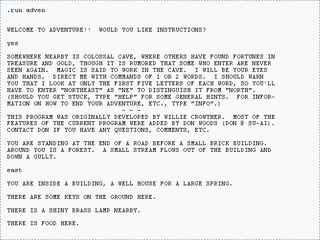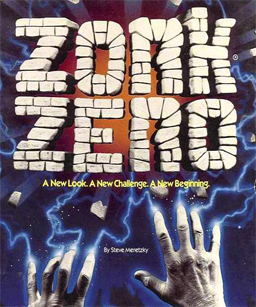Infocom was an American software company based in Cambridge, Massachusetts, that produced numerous works of interactive fiction. They also produced a business application, a relational database called Cornerstone.

Interactive fiction, often abbreviated IF, is software simulating environments in which players use text commands to control characters and influence the environment. Works in this form can be understood as literary narratives, either in the form of interactive narratives or interactive narrations. These works can also be understood as a form of video game, either in the form of an adventure game or role-playing game. In common usage, the term refers to text adventures, a type of adventure game where the entire interface can be "text-only", however, graphic text adventures still fall under the text adventure category if the main way to interact with the game is by typing text. Some users of the term distinguish between interactive fiction, known as "Puzzle-free", that focuses on narrative, and "text adventures" that focus on puzzles.

Zork is a text-based adventure game first released in 1977 by developers Tim Anderson, Marc Blank, Bruce Daniels, and Dave Lebling for the PDP-10 mainframe computer. The original developers and others, as the company Infocom, expanded and split the game into three titles—Zork I: The Great Underground Empire, Zork II: The Wizard of Frobozz, and Zork III: The Dungeon Master—which were released commercially for a range of personal computers beginning in 1980. In Zork, the player explores the abandoned Great Underground Empire in search of treasure. The player moves between the game's hundreds of locations and interacts with objects by typing commands in natural language that the game interprets. The program acts as a narrator, describing the player's location and the results of the player's commands. It has been described as the most famous piece of interactive fiction.

Steven Eric Meretzky is an American video game developer. He is best known for creating Infocom games in the early 1980s, including collaborating with author Douglas Adams on the interactive fiction version of The Hitchhiker's Guide to the Galaxy, one of the first games to be certified "platinum" by the Software Publishers Association. Later, he created the Spellcasting trilogy, the flagship adventure series of Legend Entertainment. He has been involved in almost every aspect of game development, from design to production to quality assurance and box design.
Legend Entertainment Company was an American developer and publisher of computer games, best known for creating adventure titles throughout the 1990s. The company was founded by Bob Bates and Mike Verdu, both veterans of the interactive fiction studio Infocom that shut down in 1989. Legend's first two games, Spellcasting 101: Sorcerers Get All the Girls and Timequest, had strong sales that sustained the company. Legend also profited from negotiating licenses to popular book series, allowing them to create notable game adaptations such as Companions of Xanth and Gateway. Legend also earned a reputation for comedic adventures, with numerous awards for Eric the Unready in 1993. As the technology of the game industry changed, Legend continued to expand its game engine to take advantage of higher graphical fidelity, mouse support, and the increased media storage of the compact disc.
MDL is a programming language, a descendant of the language Lisp. Its initial purpose was to provide high level language support for the Dynamic Modeling Group at Massachusetts Institute of Technology's (MIT) Project MAC. It was developed in 1971 on a PDP-10 running ITS and later ran on TENEX, TOPS-20, BSD, and AEGIS.

Leather Goddesses of Phobos is an interactive fiction video game written by Steve Meretzky and published by Infocom in 1986. It was released for the Amiga, Amstrad CPC, Amstrad PCW, Apple II, Macintosh, Atari 8-bit family, Atari ST, Commodore 64, TI-99/4A and MS-DOS. The game was Infocom's first "sex farce", including selectable gender and "naughtiness"—the latter ranging from "tame" to "lewd". It was one of five top-selling Infocom titles to be re-released in Solid Gold versions. It was Infocom's twenty-first game.

Brian Moriarty is an American video game developer who authored three of the original Infocom interactive fiction titles, Wishbringer (1985), Trinity (1986), and Beyond Zork (1987), as well as Loom (1990) for LucasArts.
Tim Anderson is an American computer programmer best known for co-creating the adventure game Zork, one of the first works of interactive fiction and an early descendant of ADVENT.

Starcross is a 1982 interactive fiction game written by Dave Lebling and published by Infocom. The game was released for the IBM PC, Apple II, Atari 8-bit family, Commodore 64, TRS-80, TI-99/4A, and later the Atari ST and Amiga. It was Infocom's fifth game and first in the science fiction genre. Starcross takes place in the year 2186, when the player's character is a lone black hole miner exploring an asteroid belt. It sold 90,315 copies.

Enchanter is a 1983 interactive fiction computer game written by Marc Blank and Dave Lebling and published by Infocom. The first fantasy game published by Infocom after the Zork trilogy, it was originally intended to be Zork IV. The game has a parser that understands over 700 words, making it the most advanced interactive fiction game of its time. It was Infocom's ninth game.

Beyond Zork is an interactive fiction computer game written by Brian Moriarty and released by Infocom in 1987. It was one of the last games in the Zork series developed by Infocom. It signified a notable departure from the standard format of Infocom's earlier games which relied purely on text and puzzle-solving: among other features, Beyond Zork incorporated a crude on-screen map, the use of character statistics and levels, and RPG combat elements.

The Lurking Horror is an interactive fiction game released by Infocom in 1987. The game was written by Dave Lebling and inspired by the horror fiction writings of H. P. Lovecraft. The original release was for MS-DOS, Apple II, Atari ST, Atari 8-bit family, and Commodore 64. It was Infocom's 26th game and the only in the horror genre. Infocom rated it as "Standard" in terms of difficulty. Later, it was ported to the Amiga with the addition of sound effects, making it the first Infocom adventure with that feature.

Zork Zero: The Revenge of Megaboz is an interactive fiction computer game, written by Steve Meretzky over nearly 18 months and published by Infocom in 1988. Although it is the ninth and last Zork game released by Infocom before the company's closure, Zork Zero takes place before the previous eight games. Unlike its predecessors, Zork Zero is a vast game, featuring a graphical interface with scene-based colors and borders, an interactive map, menus, an in-game hints system, an interactive Encyclopedia Frobozzica, and playable graphical mini-games. The graphics were created by computer artist James Shook. It is Infocom's thirty-second game.

Spellbreaker is an interactive fiction computer game written by Dave Lebling and published by Infocom in 1985, the third and final game in the "Enchanter Trilogy." It was released for the Amiga, Amstrad CPC, Apple II, Atari 8-bit family, Atari ST, Commodore 64, Macintosh, and DOS. Infocom's nineteenth game, Spellbreaker is rated "Expert" difficulty.

Deadline is an interactive fiction detective video game published by Infocom in 1982. Written by Marc Blank, it was Infocom's third game. It was released for the Amstrad CPC, Apple II, Atari 8-bit family, Commodore 64, IBM PC, Osborne 1, TRS-80, and later for the Amiga and Atari ST.

James Clavell's Shōgun is an interactive fiction video game written by Dave Lebling and published by Infocom in 1989. It was released for the Amiga, Apple II, DOS, and Macintosh. The game is based on the 1975 novel Shōgun by James Clavell. It is Infocom's thirty-third game.

Robert Bates is an American computer game designer. One of the early designers of interactive fiction games, he was co-founder of Challenge, Inc., which created games in the 1980s for the pioneering company Infocom. After Infocom's dissolution in 1989, Bates co-founded Legend Entertainment to continue publishing games in the Infocom tradition, but with added graphics. Notable games that he has designed, written, or produced include Unreal II (2003), Spider-Man 3 (2007), and Eric the Unready (1993), listed as Adventure Game of the Year by Computer Gaming World magazine and also included on the 1996 list of "150 best games of all time". In 1998 he wrote the award-winning game Quandaries for the U.S. Department of Justice. He has twice been the chairperson of the International Game Developers Association, which honored him with a Lifetime Achievement Award in 2010. Bates has written extensively about game design and development in works such as the 2001 book Game Design: The Art and Business of Creating Games, which is commonly used as a game design textbook in college courses. From 2011–2014, Bates was Chief Creative Officer for External Studios at Zynga. He continues to work as an independent consultant with various publishers in the games industry.

Marc Blank is an American game developer and software engineer. He is best known as part of the team that created one of the first commercially successful text adventure computer games, Zork.
Albert Vezza was a computer science professor and a founder of video game company Infocom.















